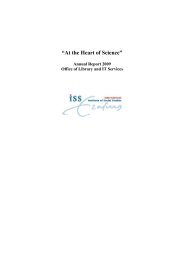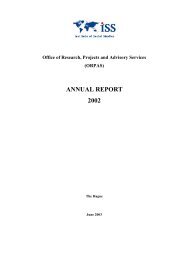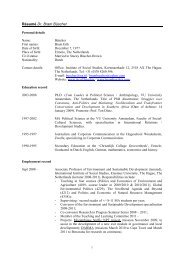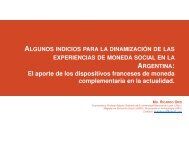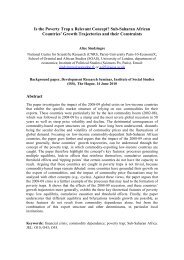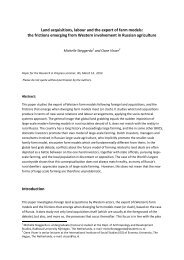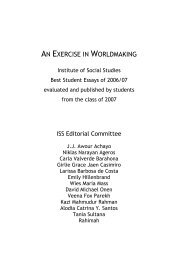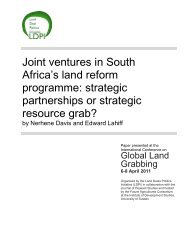AN EXERCISE IN WORLDMAKING 2009 - ISS
AN EXERCISE IN WORLDMAKING 2009 - ISS
AN EXERCISE IN WORLDMAKING 2009 - ISS
Create successful ePaper yourself
Turn your PDF publications into a flip-book with our unique Google optimized e-Paper software.
142 STEF<strong>AN</strong>IA DONZELLI<br />
institutions, such as media, educational systems, churches, etcetera, that<br />
contribute to justify oppressive power relations (Kehoe, 2003).<br />
Gramsci highlights the role of history in informing human knowledge,<br />
discourses and practices. He recognises that “objectivity always<br />
means humanly objective which can be held to correspond exactly to<br />
historically subjective: in other words, objective would mean universal<br />
subjective” (Kehoe, 2003: 14). It may be seen in line with the feminist<br />
post-modern concept of situated knowledge. Moreover, Gramscian<br />
thought will allow me to stress how linguistic activity can be conceived<br />
as praxis and recognizing how the activity of researching is an exercise of<br />
political agency toward emancipation (Kehoe, 2003). Beside this, the<br />
concept of hegemony will thus make me think of the real, or better, to<br />
the representation of the real, not as a fixed reality, but as a space for<br />
resistance and negotiation (Gledhill, 1997: 348). Media representations<br />
become thus a site for struggle and justify my intention of analysing the<br />
way in which feminist organizations represent rape/victimization.<br />
Until now, a criticism that I faced, in relation to my epistemological<br />
position, addresses the assumptions on rape and victimization that are<br />
explicated at the beginning of this work. In this case I do not think appropriate<br />
to support my assumptions with reference to the literature, for<br />
two main reasons. First, these assumptions do not aim to construct a<br />
generalization, as I made clear by the repeated use of may; on the contrary,<br />
they simply recognize that what I described may happen. Second,<br />
these assumptions are based on my personal experience of life and the<br />
one of the people I met, so I do not see the need to refer to academic<br />
literature in order to make them accepted by the reader. What I found<br />
important is only to acknowledge the presence of my experience to avoid<br />
any generalization. Moreover, the claim that my personal experience<br />
could not be objective or free from biases falls in front of the observation<br />
that “according to post-modernism, objective understanding of human<br />
development is fundamentally impossible” (Diamond, 2006: 471).<br />
Another criticism that has been moved to my epistemological position<br />
is related to my use of Gramsci. Even if I am conscious that other<br />
authors, more in line with the post-modern paradigm, have treated some<br />
of the elements of Gramscian theory that I will use in this context, I do<br />
not see the necessity of substituting Gramsci. In fact, I am very familiar<br />
with this author since he bases his theory on the analysis of Italian his-



